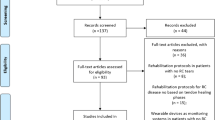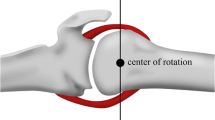Abstract
Purpose
The purpose of this study was to investigate the effect of adding multiple channeling of the greater tuberosity on the structural integrity of the repaired rotator cuff tendon.
Methods
Fifty-six consecutive patients who underwent arthroscopic rotator cuff repair and postoperative computed tomography arthrography (CTA) were included in this study; 31 consecutive patients that underwent conventional repair and 25 subsequent patients that underwent conventional repair with multiple channeling. Using CTA, the repaired rotator cuff was evaluated as either intact, incomplete, or complete leakage at the insertion and in the tendon separately. The integrity type and overall integrity was then determined by the combination of the insertion and tendon grade. Factors affecting integrity were also evaluated.
Results
At the insertion, multiple channeling significantly improved integrity; complete leakage in 35.5% in the conventional group and 4.0% in the multiple channeling group (P = 0.017). In the tendon, no significant difference was observed between the two groups. Integrity types were significantly different between the two groups (P = 0.009). For overall integrity, discontinuity was more frequently identified in the conventional group (35.5%) than in the multiple channeling group (16.0%), but it was not statistically significant. With regard to causes of discontinuity, all were due to retears in the conventional group, while 75% were due to new tears in the multiple channeling group (P = 0.009).
Conclusion
Multiple channeling is simple and easily performed without any special instrument and might augment the healing of repaired rotator cuff tendons. It could be a useful technique in rotator cuff repair helping healing.
Level of evidence
Retrospective comparative study, Level III.



Similar content being viewed by others
References
Anderson K, Boothby M, Aschenbrener D, van Holsbeeck M (2006) Outcome and structural integrity after arthroscopic rotator cuff repair using 2 rows of fixation: minimum 2-year follow-up. Am J Sports Med 34(12):1899–1905
Boileau P, Brassart N, Watkinson DJ, Carles M, Hatzidakis AM, Krishnan SG (2005) Arthroscopic repair of full-thickness tears of the supraspinatus: does the tendon really heal? J Bone Joint Surg Am 87(6):1229–1240
Calvert PT, Packer NP, Stoker DJ, Bayley JI, Kessel L (1986) Arthrography of the shoulder after operative repair of the torn rotator cuff. J Bone Joint Surg Br 68(1):147–150
Chang CH, Chen CH, Su CY, Liu HT, Yu CM (2009) Rotator cuff repair with periosteum for enhancing tendon-bone healing: a biomechanical and histological study in rabbits. Knee Surg Sports Traumatol Arthrosc 17(12):1447–1453
Charousset C, Grimberg J, Duranthon LD, Bellaiche L, Petrover D (2007) Can a double-row anchorage technique improve tendon healing in arthroscopic rotator cuff repair?: a prospective, nonrandomized, comparative study of double-row and single-row anchorage techniques with computed tomographic arthrography tendon healing assessment. Am J Sports Med 35(8):1247–1253
Cho NS, Yi JW, Rhee YG (2009) Arthroscopic biceps augmentation for avoiding undue tension in repair of massive rotator cuff tears. Arthroscopy 25(2):183–191
DeOrio JK, Cofield RH (1984) Results of a second attempt at surgical repair of a failed initial rotator-cuff repair. J Bone Joint Surg Am 66(4):563–567
Deutsch A, Kroll DG, Hasapes J, Staewen RS, Pham C, Tait C (2008) Repair integrity and clinical outcome after arthroscopic rotator cuff repair using single-row anchor fixation: a prospective study of single-tendon and two-tendon tears. J Shoulder Elbow Surg 17(6):845–852
El-Azab H, Buchmann S, Beitzel K, Waldt S, Imhoff AB (2010) Clinical and structural evaluation of arthroscopic double-row suture-bridge rotator cuff repair: early results of a novel technique. Knee Surg Sports Traumatol Arthrosc 18(12):1730–1737
Frank JB, ElAttrache NS, Dines JS, Blackburn A, Crues J, Tibone JE (2008) Repair site integrity after arthroscopic transosseous-equivalent suture-bridge rotator cuff repair. Am J Sports Med 36(8):1496–1503
Galatz LM, Ball CM, Teefey SA, Middleton WD, Yamaguchi K (2004) The outcome and repair integrity of completely arthroscopically repaired large and massive rotator cuff tears. J Bone Joint Surg Am 86-A(2):219–224
Goutallier D, Postel JM, Bernageau J, Lavau L, Voisin MC (1994) Fatty muscle degeneration in cuff ruptures. Pre- and postoperative evaluation by CT scan. Clin Orthop Relat Res 304:78–83
Huijsmans PE, Pritchard MP, Berghs BM, van Rooyen KS, Wallace AL, de Beer JF (2007) Arthroscopic rotator cuff repair with double-row fixation. J Bone Joint Surg Am 89(6):1248–1257
Jo CH, Lee JH, Kang SB, Han HS, Bae TS, Choi K et al (2008) Optimal configuration of arthroscopic sliding knots backed up with multiple half-hitches. Knee Surg Sports Traumatol Arthrosc 16(8):787–793
Jo CH, Yoon KS, Lee JH, Kang SB, Lee MC (2007) The slippage-proof knot: a new, nonstacking, arthroscopic, sliding locking knot with a lag bight. Orthopedics 30(5):349–350
Juncosa-Melvin N, Shearn JT, Boivin GP, Gooch C, Galloway MT, West JR et al (2006) Effects of mechanical stimulation on the biomechanics and histology of stem cell-collagen sponge constructs for rabbit patellar tendon repair. Tissue Eng 12(8):2291–2300
Kawamura S, Ying L, Kim HJ, Dynybil C, Rodeo SA (2005) Macrophages accumulate in the early phase of tendon-bone healing. J Orthop Res 23(6):1425–1432
Klepps S, Bishop J, Lin J, Cahlon O, Strauss A, Hayes P et al (2004) Prospective evaluation of the effect of rotator cuff integrity on the outcome of open rotator cuff repairs. Am J Sports Med 32(7):1716–1722
Knutsen G, Engebretsen L, Ludvigsen TC, Drogset JO, Grontvedt T, Solheim E et al (2004) Autologous chondrocyte implantation compared with microfracture in the knee. A randomized trial. J Bone Joint Surg Am 86-A(3):455–464
Krampera M, Pizzolo G, Aprili G, Franchini M (2006) Mesenchymal stem cells for bone, cartilage, tendon and skeletal muscle repair. Bone 39(4):678–683
Lafosse L, Brozska R, Toussaint B, Gobezie R (2007) The outcome and structural integrity of arthroscopic rotator cuff repair with use of the double-row suture anchor technique. J Bone Joint Surg Am 89(7):1533–1541
Lafosse L, Brzoska R, Toussaint B, Gobezie R (2008) The outcome and structural integrity of arthroscopic rotator cuff repair with use of the double-row suture anchor technique. Surgical technique. J Bone Joint Surg Am 90(Suppl 2 Pt 2):275–286
Liu J, Hughes RE, O’Driscoll SW, An KN (1998) Biomechanical effect of medial advancement of the supraspinatus tendon. A study in cadavera. J Bone Joint Surg Am 80(6):853–859
Mazzocca AD, McCarthy MB, Chowaniec DM, Cote MP, Arciero RA, Drissi H (2010) Rapid isolation of human stem cells (connective tissue progenitor cells) from the proximal humerus during arthroscopic rotator cuff surgery. Am J Sports Med 38(7):1438–1447
Millar NL, Wu X, Tantau R, Silverstone E, Murrell GA (2009) Open versus two forms of arthroscopic rotator cuff repair. Clin Orthop Relat Res 467(4):966–978
Millett PJ, Huffard BH, Horan MP, Hawkins RJ, Steadman JR (2009) Outcomes of full-thickness articular cartilage injuries of the shoulder treated with microfracture. Arthroscopy 25(8):856–863
Oh JH, Kim SH, Ji HM, Jo KH, Bin SW, Gong HS (2009) Prognostic factors affecting anatomic outcome of rotator cuff repair and correlation with functional outcome. Arthroscopy 25(1):30–39
Park JY, Siti HT, Keum JS, Moon SG, Oh KS (2010) Does an arthroscopic suture bridge technique maintain repair integrity?: a serial evaluation by ultrasonography. Clin Orthop Relat Res 468:1578–1587
Pauly S, Gerhardt C, Chen J, Scheibel M (2010) Single versus double-row repair of the rotator cuff: does double-row repair with improved anatomical and biomechanical characteristics lead to better clinical outcome? Knee Surg Sports Traumatol Arthrosc 18(12):1718–1729
Rodeo SA, Arnoczky SP, Torzilli PA, Hidaka C, Warren RF (1993) Tendon-healing in a bone tunnel. A biomechanical and histological study in the dog. J Bone Joint Surg Am 75(12):1795–1803
Rodeo SA, Suzuki K, Deng XH, Wozney J, Warren RF (1999) Use of recombinant human bone morphogenetic protein-2 to enhance tendon healing in a bone tunnel. Am J Sports Med 27(4):476–488
Slabaugh MA, Nho SJ, Grumet RC, Wilson JB, Seroyer ST, Frank RM et al (2010) Does the literature confirm superior clinical results in radiographically healed rotator cuffs after rotator cuff repair? Arthroscopy 26(3):393–403
Snyder SJ, Burns J (2009) Rotator cuff healing and the bone marrow “Crimson Duvet” from clinical observations to science. Tech Shoulder Elbow Surg 10(4):130–137
Steadman JR, Briggs KK, Rodrigo JJ, Kocher MS, Gill TJ, Rodkey WG (2003) Outcomes of microfracture for traumatic chondral defects of the knee: average 11-year follow-up. Arthroscopy 19(5):477–484
Steadman JR, Rodkey WG, Rodrigo JJ (2001) Microfracture: surgical technique and rehabilitation to treat chondral defects. Clin Orthop Relat Res 391(Suppl):S362–S369
Sugaya H, Maeda K, Matsuki K, Moriishi J (2007) Repair integrity and functional outcome after arthroscopic double-row rotator cuff repair. A prospective outcome study. J Bone Joint Surg Am 89(5):953–960
Thomazeau H, Rolland Y, Lucas C, Duval JM, Langlais F (1996) Atrophy of the supraspinatus belly assessment by MRI in 55 patients with rotator cuff pathology. Acta Orthop Scand 67(3):264–268
Uhthoff HK, Trudel G, Himori K (2003) Relevance of pathology and basic research to the surgeon treating rotator cuff disease. J Orthop Sci 8(3):449–456
Verma NN, Dunn W, Adler RS, Cordasco FA, Allen A, MacGillivray J et al (2006) All-arthroscopic versus mini-open rotator cuff repair: a retrospective review with minimum 2-year follow-up. Arthroscopy 22(6):587–594
Wolfman NM, Hattersley G, Cox K, Celeste AJ, Nelson R, Yamaji N et al (1997) Ectopic induction of tendon and ligament in rats by growth and differentiation factors 5, 6, and 7, members of the TGF-beta gene family. J Clin Invest 100(2):321–330
Yamamoto N, Itoi E, Tuoheti Y, Seki N, Abe H, Minagawa H et al (2007) Glenohumeral joint motion after medial shift of the attachment site of the supraspinatus tendon: a cadaveric study. J Shoulder Elbow Surg 16(3):373–378
Yoo JC, Ahn JH, Yang JH, Koh KH, Choi SH, Yoon YC (2009) Correlation of arthroscopic repairability of large to massive rotator cuff tears with preoperative magnetic resonance imaging scans. Arthroscopy 25(6):573–582
Zanetti M, Gerber C, Hodler J (1998) Quantitative assessment of the muscles of the rotator cuff with magnetic resonance imaging. Invest Radiol 33(3):163–170
Zumstein MA, Jost B, Hempel J, Hodler J, Gerber C (2008) The clinical and structural long-term results of open repair of massive tears of the rotator cuff. J Bone Joint Surg Am 90(11):2423–2431
Conflict of interest
Authors have no conflict of interest.
Author information
Authors and Affiliations
Corresponding author
Rights and permissions
About this article
Cite this article
Jo, C.H., Yoon, K.S., Lee, J.H. et al. The effect of multiple channeling on the structural integrity of repaired rotator cuff. Knee Surg Sports Traumatol Arthrosc 19, 2098–2107 (2011). https://doi.org/10.1007/s00167-011-1520-2
Received:
Accepted:
Published:
Issue Date:
DOI: https://doi.org/10.1007/s00167-011-1520-2




